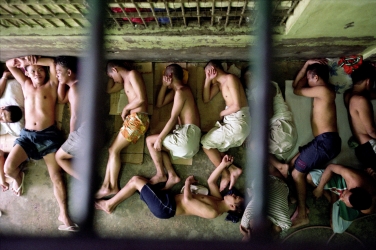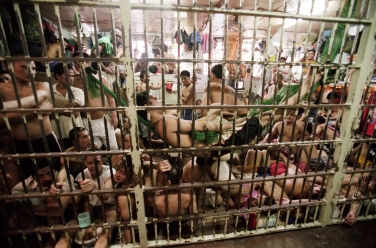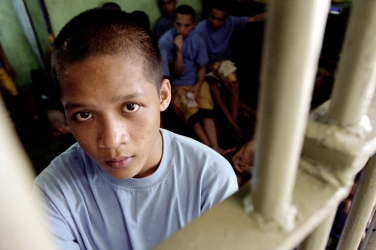 |
Kids Behind Bars
July 2006 |
 |
|||||||||
|
I was approached by the charity Jubilee Action (with whom I have a long-standing working relationship) to be part of their campaign and global report on children in prison called, "Kids Behind Bars: We Must Act."
The charity knew that to get people to respond we needed photographs to show the truth. Jubilee then decided to approach their partners in Pakistan, Uganda and the Philippines to see if they could get me access without compromising their aid work and without endangering me. It turned out to be too dangerous to get into the Pakistan and Uganda prisons. However, Jubilee's partner in the Philippines, "PREDA," felt that they could sneak me into the Filipino prisons as an aid worker and part of their jail team. They used this tactic regularly to take in Westerners without too much suspicion.
There were limits on how much gear I could take in because I had to appear as an aid worker and not as a photojournalist. I broke down my camera as small as it would go and just took in two lenses without any lens hoods: a 50mm and my 16-35mm lens. I decided not to take a flash, thinking it would look too professional; I didn't want the guards to be aware of how many photographs I was taking. We decided it was best not to hide the main body of the camera and the small lens; we would tell the guards I was taking "a few shots" for the charity to help raise money for their work in jails (PREDA represents children in the legal system and the small prisoners are freed into their care).
The working conditions were very hard in all four of the prisons in which I worked. There was little natural light so I had to use fast film and slow shutter speeds.
I saw children detained in overcrowded cells and uninhabitable conditions: flooded and damp cells with dim light, stifling heat and no fresh air. Many children had skin conditions after being months, even years, in these conditions. I saw kids covered in ringworm, boils and scabies. There was a stench of stale body odor and urine that in the humid environment became unbearable.
In one of the prisons, I walked through dirty river water that was across the whole floor area of the jail—it came halfway up my shins. I learned that the flooding was a daily occurrence the inmates have to endure.
This situation has gone on for years in the Filipino jails. The government has never reformed the justice system and has chosen to ignore the plight of the children. PREDA has been campaigning for years to reform the justice system. The Filipino government has been ignoring the charity's efforts. But the new campaign has prompted the government to start taking action due to international pressure.
I was greatly shocked and moved by what I saw. I found it hard to rationalize that I was seeing children in this way, in our modern age. I felt like I had been translated back 100 years. Even though I had been told that the sites in the jails would be shocking, nothing could have prepared me for what I saw. I was angered that there could be such injustice for these children. Without the help of the charity they get lost in the jails and justice system. Some of the boys I met had already been in prison six months without a hearing and were imprisoned on an accusation.
My images have been featured in all Jubilee Action's literature for their global campaign. They have been shown on national TV news in Asia, the U.K. (ITV) and the United States (CNN). The U.N. Criminal Justice Reform has used them for the 15th Session of the Commission on Crime Prevention and Criminal Justice. The story has also been published in U.S. News and World Report in the United States through ZUMA Press and in the U.K., Sweden and Belgium. The photographs have been exhibited in London in the Newsroom as part of The Observer Hodge exhibition. And a few of the images are about to be exhibited at the National Theatre for "The Press Photographer's Year" exhibition and book.
The photographs have won three awards – 1st prize in The Observer Hodge Award, a special award in the U.K.'s Picture Editor Awards and is in this year's PDN annual. I would like them to be continually used to help the campaign for justice for these children and to help stop children being imprisoned in adult jails.
I want to follow up this story to keep track of a child prisoner named Matthew whom I saw released into the charity's care. I want to return and photograph the jails again to see if any changes were made.
© Hazel Thompson
Dispatches are brought to you by Canon. Send Canon a message of thanks. |
||||||||||
Back to July 2006 Contents
|
|



